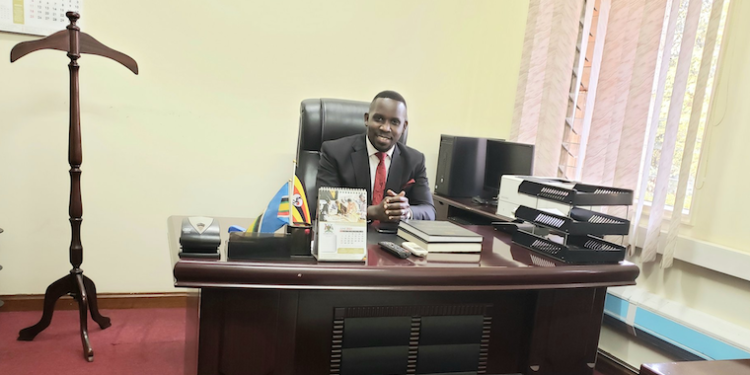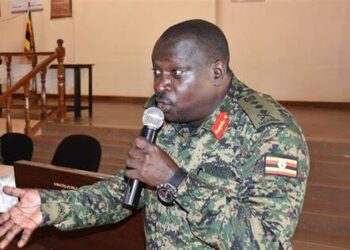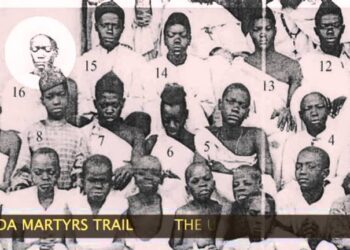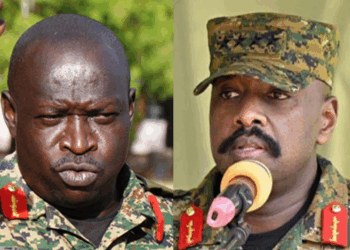By THE OBSERVER UG
On December 22, a significant announcement shook the political landscape in Uganda as Joel Ssenyonyi assumed the role of Leader of the Opposition (LoP) in Parliament, succeeding Mathias Mpuuga.
In an exclusive interview with BAKER BATTE LULE, Ssenyonyi addressed various aspects of his new leadership role and the dynamics surrounding it. Ssenyonyi acknowledged that his previous interactions with the speaker of Parliament, Annet Anita Among, had been marked by tension, with the speaker once openly characterizing him as lazy.
However, Ssenyonyi expressed his readiness for a fresh beginning in this new capacity. He conveyed optimism that Speaker Among would extend her support in his new role, signaling a shift from the adversarial relationship that had characterized their interactions during his tenure as the head of the Committee on Commissions, Statutory Authorities, and State Enterprises (COSASE).
This development carries significant implications for the political landscape in Uganda, as Ssenyonyi takes on the crucial role of Leader of the Opposition in Parliament. His ability to navigate and collaborate within the parliamentary framework, particularly with the speaker, will be closely watched by political observers and stakeholders alike.
The hope is that this new chapter in Ssenyonyi’s political career will usher in a more cooperative and constructive approach in the nation’s legislative process. Read the excerpts:
What was your reaction when you were informed that you would be assuming the role of the new Leader of the Opposition?
It was a mixed bag of emotions for me – a tinge of excitement, but also a dose of contemplation as I considered the challenges that lay ahead. My mind was filled with thoughts.
While the realization that I would be the next Leader of the Opposition (LoP) brought excitement, it was tempered by the awareness of the substantial work that lay ahead. As I reflected on the responsibilities ahead of me, the initial excitement waned, but it was replaced with a sense of humility. It’s truly humbling that my colleagues in leadership deemed me deserving of this role.
I understand that you hold positions in all the decision-making bodies of your party. Can you explain how you reached the conclusion that Joel was the most suitable candidate for this role?
Several names were considered during this deliberation process, and it’s worth noting that, due to my involvement, I was rightfully excluded from certain meetings.
This exclusion aligns with the principles of impartiality and fairness. However, the ultimate decision-making authority lies with the National Executive Committee (NEC). Prior to reaching this final stage, extensive consultations took place, culminating in the NEC’s decision. This summarizes the overall process.
It appears that the process leading up to your announcement as the Leader of the Opposition (LoP) did not proceed as smoothly as anticipated. The meeting that preceded your announcement took longer than expected. What were the points of contention that led to this extended deliberation?
To begin with, it’s important to clarify that
the meeting you mentioned was just one in a series of numerous lengthy meetings that had taken place over the past few weeks. The reason why this particular meeting extended beyond the expected timeframe was primarily due to the anticipation surrounding the announcement of the next Leader of the Opposition (LoP).
However, it’s essential to note that this meeting was not solely focused on the LoP position. Several other key roles, including the Chief Whip and the composition of the entire shadow cabinet, were also on the agenda. Considering the multitude of positions and the necessary considerations and discussions, it is not surprising that the meeting took longer than anticipated.
You mentioned the National Executive Committee (NEC), but I observed that following the NEC meeting, the secretary general presented a pre-printed list. It appears as though the top party executives had already predetermined their decisions. Can you clarify the purpose of convening the NEC if the decisions had already been made beforehand?
In fact, that’s not accurate. The list that the secretary general had, included the names of the existing leadership, and the new appointments were added in ink.
This is why the media did not receive a copy immediately; they had to visit the office to type it out. So, the list you saw initially represented the current leadership, from the Leader of the Opposition to all other leaders, and everything during the NEC meeting was indeed written in ink.
Therefore, the assertion of pre-determined positions is not accurate. It’s important to note that even the NEC members were consulted in this process, emphasizing that it was a thorough and inclusive decision-making process.
What is the leadership of Ssenyonyi bringing on the table?
First and foremost, I would like to extend my heartfelt appreciation to the Right Honourable Mathias Mpuuga for his outstanding leadership and dedicated service during some incredibly challenging times. Following the 2021 elections, with our party taking the helm of the opposition, we faced a myriad of complex challenges.
Tragically, lives were lost, individuals were incarcerated, and some even went missing. The circumstances were extraordinarily difficult, to say the least. In the face of these formidable challenges, Mathias Mpuuga exhibited unwavering resolve and steered us through turbulent waters. The expectations placed upon our leadership were exceedingly high, but he remained resolute and provided guidance. I wholeheartedly salute him for his remarkable leadership.
Importantly, it’s worth noting that he continues to be an integral part of our leadership team, and I firmly believe there is much wisdom to glean from him and those who served in leadership roles before him. This is where I intend to begin, by forging connections with my fellow leaders and seeking their insights on various matters.
While I do bring my own ideas and perspective as a leader, I recognize the importance of collaborative decision-making. When we come together, I will share my thoughts and engage in discussions with my colleagues. This leadership journey is not a solitary endeavor; it thrives when we collectively contribute our insights, and it ensures that the burdens of leadership are not carried by one individual alone.
You say you intend to consult with Mpuuga, but it’s essential to note that he was replaced due to the party’s dissatisfaction with his methods. Why do you believe consulting with someone whose approach was not appreciated by the party is a wise course of action?
“Rejected”, what do you mean? Because if he were rejected, he wouldn’t be a commissioner, which is not a small position. The commission holds a prominent position within parliament, with the speaker chairing this important body.
Of course, you cannot equate being a commissioner to LoP.
Without a doubt. So, does that imply that he was demoted for not doing a good job? Indeed, people are entitled to their opinions, and I began by acknowledging and saluting Mathias Mpuuga for his leadership and his contributions. None of us are without imperfections, and it’s important to recognize that Ssenyonyi, as his successor, will not perform miracles on his own.
That’s precisely why I emphasize the importance of teamwork and collaboration. Even when one may not be perfect, there are significant contributions that individuals can make. Mathias Mpuuga has demonstrated his ability to make meaningful contributions, which is why the leadership still values his role, even though he has been assigned to a different position. It’s essential for us to adapt to the concept of change.
In Uganda, where President Museveni has held office for nearly 40 years, many citizens have never known any other leader, making the idea of change a significant adjustment. Our belief, as the National Unity Platform, is in empowering new leaders after a term of two and a half years.
This doesn’t imply that Mathias Mpuuga was replaced due to incompetence; if that were the case, he wouldn’t have been considered for another prominent position. Change is a fundamental part of our political philosophy, aimed at ensuring that leadership is refreshed and new voices are heard.
Speaking of offering him another position, it’s worth noting that it’s unprecedented for someone to be demoted from the number one position and then subsequently selected as number three. In the past 20 years of the opposition, when someone was dropped, they typically remained out of the leadership. What was the intention behind this unusual decision?
There is no set template for these things. I recall being in the media when Professor Ogenga Latigo became the Leader of Opposition (LoP); it was a first at the time after we transitioned into multiparty politics. He served his term, and there have been several other leaders since then.
Was he a bad leader? No. Was he perfect? No, but he led effectively. Following him, we saw leaders like the Honorable Nandala Mafabi, Winnie Kiiza, and others. Therefore, we should become accustomed to the idea that leadership can and does change.
However, appointing him as a commissioner raises questions about the rationale behind this decision. Unlike the others you’ve mentioned, none of them were dropped from their positions and then placed in another role. What was the strategic calculation behind this move?
Firstly, there was no calculated strategy behind this decision. Secondly, there was no intention to placate anyone because placating implies trying to calm a turbulent situation, which did not exist in this context.
Mathias Mpuuga could have chosen to become a backbench member of parliament, a path taken by previous LoPs. However, as the National Unity Platform (NUP), we believe that his leadership still holds value, and we can benefit from it in a different capacity. This reflects our belief in the continued service he can provide to the party. Importantly, Mathias Mpuuga has accepted the party’s nomination for the role of commissioner, which underscores the significance of this decision.
He has not expressed discontent or questioned the rationale behind the change, demonstrating an appreciation for the value of change and its positive impact.
What do you intend to do?
I will start by highlighting the importance of the law, specifically the Administration of the Parliament Act and our Rules of Procedure. These documents outline the roles of the Leader of the Opposition (LoP), with a particular emphasis on the critical task of holding the government accountable.
This accountability takes various forms. Firstly, Uganda has grappled with a persistent issue for many years – the misallocation of budgeted funds. Money allocated for specific projects often seems to vanish into thin air. It is our duty to ensure that the government is held accountable for taxpayers’ money.
We must demand transparency and oversight to prevent these funds from being misappropriated. Secondly, our country faces a substantial challenge regarding poor service delivery. Taxpayers do not often see commensurate value for their money. Therefore, it is our responsibility to scrutinize government actions and demand better service delivery when public funds are allocated for specific projects.
We cannot accept a situation where the public’s hard-earned money fails to translate into quality services. Furthermore, we cannot condone a scenario where individuals are subjected to harm or imprisonment simply based on their political beliefs. This is unacceptable, and we must vocally oppose such injustices.
When we adjourned, the issue of missing persons and human rights violations was a pressing concern in parliament. We concluded that there must be a comprehensive inquiry into these matters. While not everyone may share this perspective, I aim to rally my colleagues to address these issues effectively.
It’s crucial to recognize that within the opposition, we have diverse parties, including NUP, FDC, UPC, JEEMA, DP, PPP, and others. As a leader, it’s essential to acknowledge and collaborate with all these groups. We are more alike than different, and working together can lead to more impactful outcomes.
You are entering a parliament led by a speaker with whom your relationship over the past two years has been marked by clashes, and some of your CASASE reports were not adopted. What sort of relationship can we expect to see you establish with the speaker now that you are in a position that necessitates at least a functional working relationship?
I don’t necessarily need to establish a friendship with the speaker. We both hold leadership positions and operate within our respective roles. There should be common ground where we can find agreement and areas where our disagreements are made clear. Being friends is not a prerequisite.
In the National Unity Platform (NUP), I am a leader, and while I may have friendships with some fellow leaders, it’s not a universal requirement. Similarly, in parliament, the colleagues I work with don’t all have to be my friends, including the speaker. My focus is on fulfilling my responsibilities.
The bare minimum, and I’ve expressed this to the speaker before, is that as speaker, she represents all of us. Even though she belongs to the NRM, when holding the position of speaker, neutrality is expected, as she is a leader for all of us. This means providing equal space, and not letting political differences lead to conflicts.
An illustrative example is the issue of missing persons. Parliament passed a resolution, and during that time, it was the deputy speaker presiding. The resolution required the government to respond within thirty days, but the deadline passed without a response. The speaker was angered with those of us demanding a response, but we made it clear that our issue wasn’t with her but with the government.
We emphasized that she shouldn’t bear the responsibility for their failure to respect the parliamentary resolution. I will continue to emphasize the importance of the speaker remaining neutral and allowing those responsible for their actions to bear the consequences.
Where agreement is possible, we will find it; where there are disagreements, I will clearly express my position. Even in committees, I believe in respecting the right of minority opinions, and it’s essential for everyone to understand that differing views are part of the democratic process. During my tenure as the chairperson of COSASE, we didn’t have a single minority report, but I acknowledge that committees have the right to express dissenting opinions, and I will respect that right, moving forward. Nobody should take offence at my approach; it’s all part of our parliamentary democracy.
For those of us observing from the outside, we have witnessed an adversarial relationship between you and the speaker. Are we now witnessing a change in tone, or should we expect a continuation of the same dynamic?
I made my position very clear during a particular instance when the Uganda Airlines report was prepared, and I requested that it be included on the order paper. However, the speaker indicated that it had leaked, to which I responded by suggesting that efforts be made to identify the source of the leak.
There is no rule that dictates a report should not be presented if it has been leaked, as doing so would undermine the authority of our committees. This was one point of contention. Additionally, we disagreed when the speaker issued a directive that certain entities should be discussed in camera (privately).
I questioned this decision and sought clarification, as I believed that, as a leader of the committee, I deserved to know the reasoning behind it. I expressed concern that such a move could lead to misunderstandings since we had been conducting investigations openly for other cases.
While I acknowledged that some discussions could indeed occur privately, provided there was a valid reason, I questioned the lack of sufficient justification in this particular instance. This disagreement led to tension, and the speaker seemed to become annoyed. However, I later communicated to her that if she had concerns, it would have been more constructive for her to approach me directly to discuss them rather than resorting to public statements.
I emphasized that I would have been willing to explain the rationale behind my actions. It’s important to note that I do not view the parliamentary environment as one where orders are given and blindly followed, akin to the military. Instead, I believe in open and constructive dialogue.
I intend to convey to the speaker that if she has any concerns, it would be more productive to engage in a discussion to better understand each other’s perspectives, rather than escalating conflicts publicly.
What kind of leader should she expect?
First and foremost, I see myself as a leader who will execute my mandate in accordance with the law. I genuinely hope to receive support from the speaker in fulfilling my role of holding the government accountable. It’s important to emphasize that this responsibility is not mine alone; I am carrying it out on behalf of parliament and the people of Uganda.
Furthermore, I’m optimistic that I can find allies even among members of the NRM, as the quality of service delivery affects all of us and transcends political boundaries. There is a divergence in the approaches that leadership should take.
Mathias Mpuuga was well-liked, even by some within the government, as he was regarded as a gentleman. On the other hand, you lead a group of young individuals who advocate for a more assertive parliament. What can we anticipate in terms of your approach, considering these two differing styles?
In my approach, I have a range of tools in my toolbox, and as a leader, it’s crucial to discern which tool is most suitable for the task at hand. There will be situations where I can collaborate with colleagues across the aisle, advocating for budget allocations that prioritize essential areas like healthcare.
In contrast, I might question seemingly questionable budget items, such as significant sums allocated for behavior change, which can often be a cover for misappropriation of funds. In these instances, engaging with colleagues to align on the right course of action is essential.
However, there will also be moments where I firmly stand my ground and articulate my position clearly. It’s a matter of assessing when to apply which approach.
I do have some friends within the NRM, and a few have reached out to congratulate me, expressing their belief in my ability and wishing me success. While the extent of their support may vary, it provides a starting point for potential allies in holding the government accountable.
When examining your cabinet, the first question that comes to mind is, what are your impressions of the individuals you have been assigned to work with?
The opposition in parliament includes more than just NUP; so, it’s essential to unite everyone and function as a cohesive team. It’s noteworthy that our cabinet lineup is diverse, with proper representation from the opposition. Importantly, this list isn’t solely based on affirmative action; the individuals on the lineup are highly competent, and I have confidence that we will collaborate effectively to fulfill our mandate.
You are the youngest Leader of the Opposition (LoP) at 37 years of age, and some individuals have reservations based on your age and experience, questioning whether you are suited for the responsibilities of the role you have been assigned.
Firstly, the expectations are indeed high, which presents a challenge for leadership. When people’s expectations are elevated, it means we have to bring our best to the table. Some have commented on my youth and lack of experience, but it’s important to note that experience isn’t something you can purchase in a store.
Even those who are considered experienced were given opportunities. For instance, when individuals like General Mugisha Muntu emerged from the bush, he became an army commander at a young age of around 30. Dr Kizza Besigye served as a minister at just 30. Similarly, when Robert Kyagulanyi [NUP president] declared his candidacy for the presidency, he was the same age as I am now.
Some initially dismissed him, but he has gone on to lead effectively. When I was appointed as the chairperson of COSASE, there were doubts about my suitability for the role, given my relatively short time in politics. However, along the way, some of those same skeptics were expressing appreciation for the work accomplished by the team I led.
It’s natural for people to have doubts and reservations; that’s part of human nature. Doubting Thomases exist, but with time, they will come to recognize who I am and what I can achieve. I’m eager to collaborate effectively with the team I’ll lead on the opposition side.
Additionally, I hope to build alliances across the aisle because issues related to service delivery transcend political affiliations. My aspiration
is for collective efforts in addressing these matters, and I’m looking for Ugandans from all walks of life to join us in this endeavor. Above all, I’m a believer, and I have faith that God will guide and assist me in executing my mandate effectively.
{loadposition inarticle]






Discussion about this post